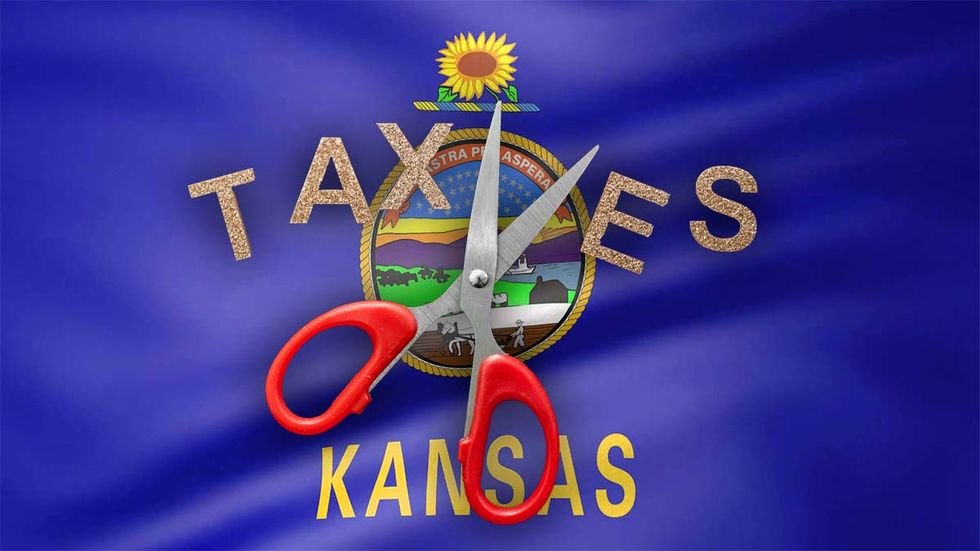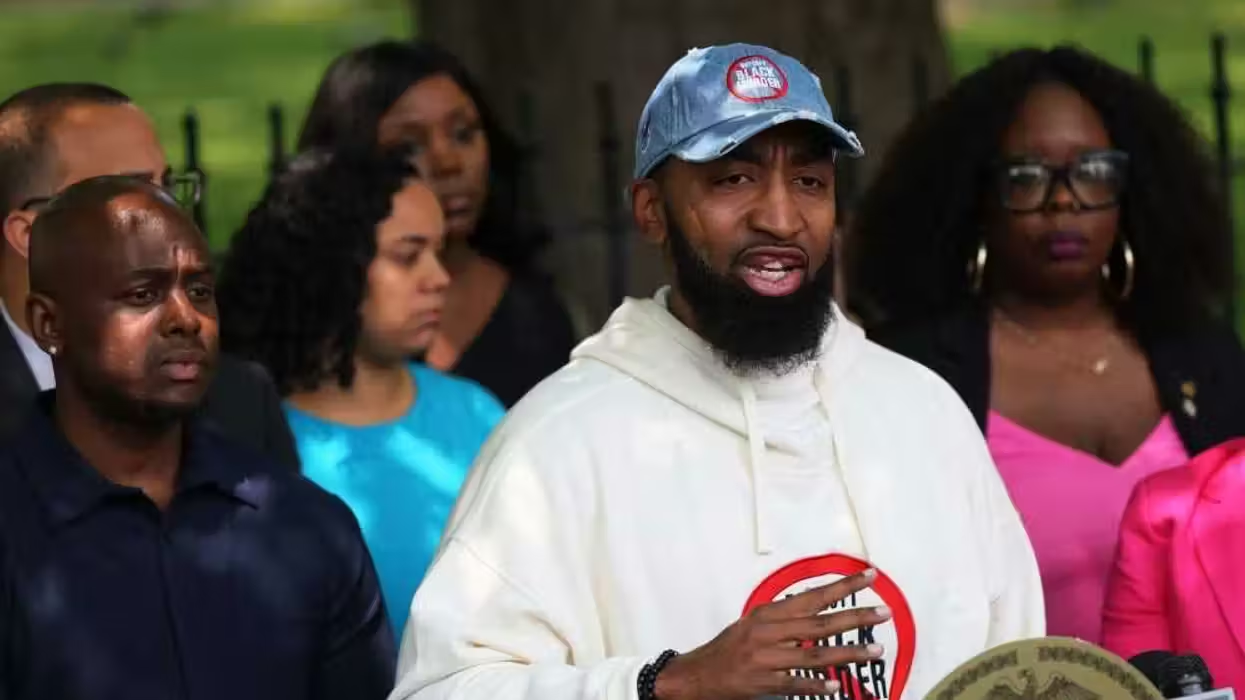
© 2025 Blaze Media LLC. All rights reserved.
There are some debates that never die on Capitol Hill.
During the Senate Budget Committee confirmation hearing for Rep. Mick Mulvaney, R-S.C. (A, 94%) two weeks ago Senator Angus King. I-ME (F, 3%) asked President Trump’s Office of Budget and Management director nominee if tax cuts should be “revenue neutral.”
Mulvaney argued that reform to simplify the tax code was necessary, which would help the IRS increase collections. Specifically, on the issue of tax rates, Mulvaney said: “Given the political situation we face in this country, I think the best chance you have to reduce the deficit or balance the budget is to accomplish economic growth.”
Senator King replied:
I would agree with that, but there's this theology out there that lowering taxes equals greater economic growth. I have tried seriously to find economic studies to substantiate that. I haven't been able to find them … the Bush tax cuts last decade did not have that effect. My understanding of the experiment going on in Kansas is that it has not had that effect.
So, I think we need to be careful with a cavalier assumption that tax cuts will indeed stimulate growth and therefore be self-funding. That's an idea that kicks around here, but I don't think there's much data to support it. And the problem is if that doesn't work, you have only dug the hole deeper.
Senator King, of course, is challenging the concept behind the Laffer Curve — the idea that you can lower taxes yet generate higher tax revenues. It was this concept that was behind President Ronald Reagan’s supply-side tax cuts — a policy that led to the vibrant economic growth in the 1980s after the Jimmy Carter stagflation years and, indeed, led to increased tax revenues.
And it was the Reagan model that current Kansas Governor Sam Brownback adopted in his state. Ian Fury, Brownback’s communications and policy strategist, took umbrage with Sen. King’s characterization of Kansas’ reforms.
I guess 5 consecutive years of record business formations doesn't constitute "economic growth" in @SenAngusKing's world. https://t.co/UM8zutSiJx
— Ian Fury (@fury_ian) January 24, 2017
I guess @SenAngusKing doesn't think the US economy needs low unemployment. KS' unemployment rate has been below 5% for 37 months. #ksleghttps://t.co/UM8zutSiJx
— Ian Fury (@fury_ian) January 24, 2017
.@SenAngusKing should inform himself on the realities of Kansas before taking uninformed shots. Tax cuts have nothing to do with ag and oil. https://t.co/UM8zutSiJx
— Ian Fury (@fury_ian) January 24, 2017
In light of Rep. Mulvaney’s OMB hearing, Brownback’s office reached out to Conservative Review to correct the record on the Sunflower State.
The Kansas Experiment
In 2012, under Governor Brownback’s leadership, Kansas passed a tax relief program for individuals and small businesses. The state’s three-bracket income tax system was consolidated into two brackets. The two higher brackets with rates of 6.45 percent and 6.25 percent were cut to 4.9 percent. And the lower bracket rate was cut from 3. 5 percent to 3 percent. That tax relief was modified in 2013, and today the rates are 4.6 percent on the upper bracket and 2.7 on the lower bracket. Small businesses in the state also received a reduced rate.
Gov. Brownback defends this conservative “experiment” as a successful job-creating policy.
CR: When Sen. Angus King says this “experiment” going on in Kansas has not led to economic growth, what “experiment” is he referring to?
Brownback: Well, I presume he's talking about our tax cuts that we did in 2012, and thanks for reading that to me — we just had an economic study done on our tax relief by Arizona State University showing that it's working. I will send [King] a letter with this study so that he now has a study that shows him that it's working. I will do that.
I think things get mixed up on what's going on in Kansas. We cut income taxes to spur job growth. That was the target — to grow jobs. Long term we believe — and I think this is still accurate and true — that this will create more revenues for the state. But the short-term objective of this was to stimulate business formation and job growth … of which it has. We have had record new business filings in the state every year since the tax cuts, while nationwide business filings are down. So we've been bucking the national trend there.
The Arizona State study the governor referenced states “the impact of the tax reforms has been positive” for the targeted economic sectors. The study shows that most of the private-sector job growth has been from “pass-through” businesses, and that private-sector employment grew in Kansas at a time when other comparable states saw a drop in their average growth rate.
On the other hand, left-leaning critics point to employment numbers that lag behind national numbers …
CR: Now, just to push back on you a little bit … people on the other side say that job growth has lagged behind the national average since your 2012 cuts. On the other hand, the Center for Budget Policy Priorities, which is a left-leaning organization, counter that those job statistics are not accurate.
Brownback: I want to talk a little bit the commodity markets, because we have lost a number of oil- and gas-related jobs. Eaton Corporation just announced they're going to be cutting out 100 jobs in the state building hydraulic equipment, much of which goes into agricultural equipment.
We are heavily dependent. This is a bit of an old example, and it's not completely accurate now, but Kansas is a three-legged economy here — agriculture, oil and gas, and aviation. Regarding aviation, the small jets aren't doing that well, but the big stuff's doing great. Agriculture is doing terrible; commodity price is bad. Oil has been bad.
That drives a lot of our receipts, and it does drive employment in the state as well, as it does in other commodity-based states. If one wants to be fair about it, I think you have to really dig into the data — and our target has been small-business growth, of which has taken place.
Indeed, commodity prices have been falling, causing budget shortfalls in recent years.
CR: Now, in addition to what they claim is lagging job growth, opponents argue that tax revenues in Kansas have been falling — that this “scheme” of tax reform has dug a hole in the state budget. Can you speak to those falling revenues? What do you believe is the cause?
Brownback: Oil and gas and agriculture. Then look, too, at what is falling. It's sales-tax receipts, and if you look at a county-by-county map of the state, it's sales-tax receipts in our commodity-dependent counties. Our urban counties are producing increases in sales tax, and its corporate income tax receipts that are down — which we didn't touch. We left those alone.
You know the area where we've had growth over our projections on tax receipts? It's personal income taxes — the ones we cut. Those are the ones we are seeing growth in. People want to make political arguments, and that's fine — I'm used to doing that. But I think a fair analysis of it … look at what your target was and look at all the factors that are going on. And then appraise really whether these tax cuts have been successful in doing what they were targeted to do, which is job growth and business formation.
In the next part of this interview, Governor Sam Brownback discusses policies of the Trump administration.
Editor's note: This piece has been updated to clarify current tax rates in Kansas.
Want to leave a tip?
We answer to you. Help keep our content free of advertisers and big tech censorship by leaving a tip today.
Want to join the conversation?
Already a subscriber?
more stories
Sign up for the Blaze newsletter
By signing up, you agree to our Privacy Policy and Terms of Use, and agree to receive content that may sometimes include advertisements. You may opt out at any time.
Related Content
© 2025 Blaze Media LLC. All rights reserved.
Get the stories that matter most delivered directly to your inbox.
By signing up, you agree to our Privacy Policy and Terms of Use, and agree to receive content that may sometimes include advertisements. You may opt out at any time.






